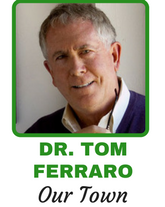Now that a phasing in of American life has started one wonders what it will be like.
The last time I was asked to describe a national identity after a trauma was when I did a TV show following the overthrow of Saddam Hussein. Widespread thinking was that the people of Iraq were freed and would be running through the streets in joy, have finally been released from the reign of terror.
I informed the television commentator at the time that we would instead be observing a nation plagued by what is called complex post-traumatic stress disorder for an extended period of time.
So now Americans have also endured a significant reign of terror in the guise of COVID-19 and its worthwhile to discuss what’s the likely psychological damage done to us.
Post-traumatic stress disorder is defined as a condition that occurs when a person witnesses an event that involves actual or threatened death engendering fear and helplessness in the person.
This is usually followed by recurrent recollections of the event, dreams about same, a dissociated feeling, distress when internal cues symbolize the event, a host of psychosomatic reactions, a feeling of being numb, avoidant of people and places, diminished interest in activities, detachment, no sense of the future, poor sleep, poor concentration, anxiety, hypervigilance, startle responses and lots of survivor guilt.
When a traumatic event occurs about one-third of those involved will develop these kind of symptoms acutely, chronically or in a delayed way six months later.
America has gotten up close and personal with death as we witnessed upwards of 34,000 deaths as we hear of constant reports of death counts. COVID-19 has induced PTSD in many of us.
Examples of this state of mind abound. I recently saw a person driving in the wrong direction on Wantagh State Parkway. This is evidence of a dissociated state or more commonly known as ‘the fog of war.’
When you observe people going through red lights now it’s evidence of poor concentration. When you see people pushing you away in order to buy a roll of paper towels this is a sign of serious anxiety. When doctors begin to see patient after patient complaining of minor aches and pains this is a sign of psychosomatic disturbance on a high level.
I have never in my career seen virtually every patient I have seen be thoroughly consumed, focused on and anxious about a single event.
But COVID-19 has done just that.
You have heard Trump and his scientific team constantly use words like “this is a war, we have an invisible enemy, you are all warriors in this war.”
These terms are aptly used and it implies our nation is at war and as such we are the warriors. And warriors often succumb to PTSD.
So what is the right treatment for a person who has post-traumatic stress disorder?
The primary damage done with PTSD is a pervasive feeling of helplessness and hopelessness. The future is foreclosed and the victim enters into an eternal present.
The best way to treat this is to engage in everyday tasks that are easy to tackle. Stick to a routine. Do the dishes, make a meal, take a long walk with the awareness that you have accomplished something useful.
Keep a structured bed time and get eight hours per night. Eat well and drink less alcohol. These are all proactive measures that build effectance and have the added benefit of supporting your immune system.
It also helps to talk about what you are going through. The reason so many Vietnam vets contracted PTSD was because they flew back to the states right from the war zone. Following WWII the solders all took ships back to the states and had a full two weeks to discuss what they all had endured. Talking helps.
Since this enemy is biological there is enormous anxiety about bodily changes in temperature, headaches , back pain, sore throats, colds and fatigue.
For the most part these commonplace symptoms are and have always been a part of daily life on the planet. If you notice that each day you become obsessed with a different bodily symptom it is likely that you’re becoming anxiously somatic.
Just this realization can be calming and allows you to be comforted and at ease.
Talking about your experience is curative. This pandemic forced extreme and social isolation which instilled a feeling of imprisonment, loss and fear of death.
This is by no means an easy affair. But if you remain proactive and careful and share experiences, and attempt an optimistic attitude your sense of power will return as will your confidence.
A strong belief in yourself and your own strength is one of the most potent weapons a warrior, an athlete and citizen can have.



